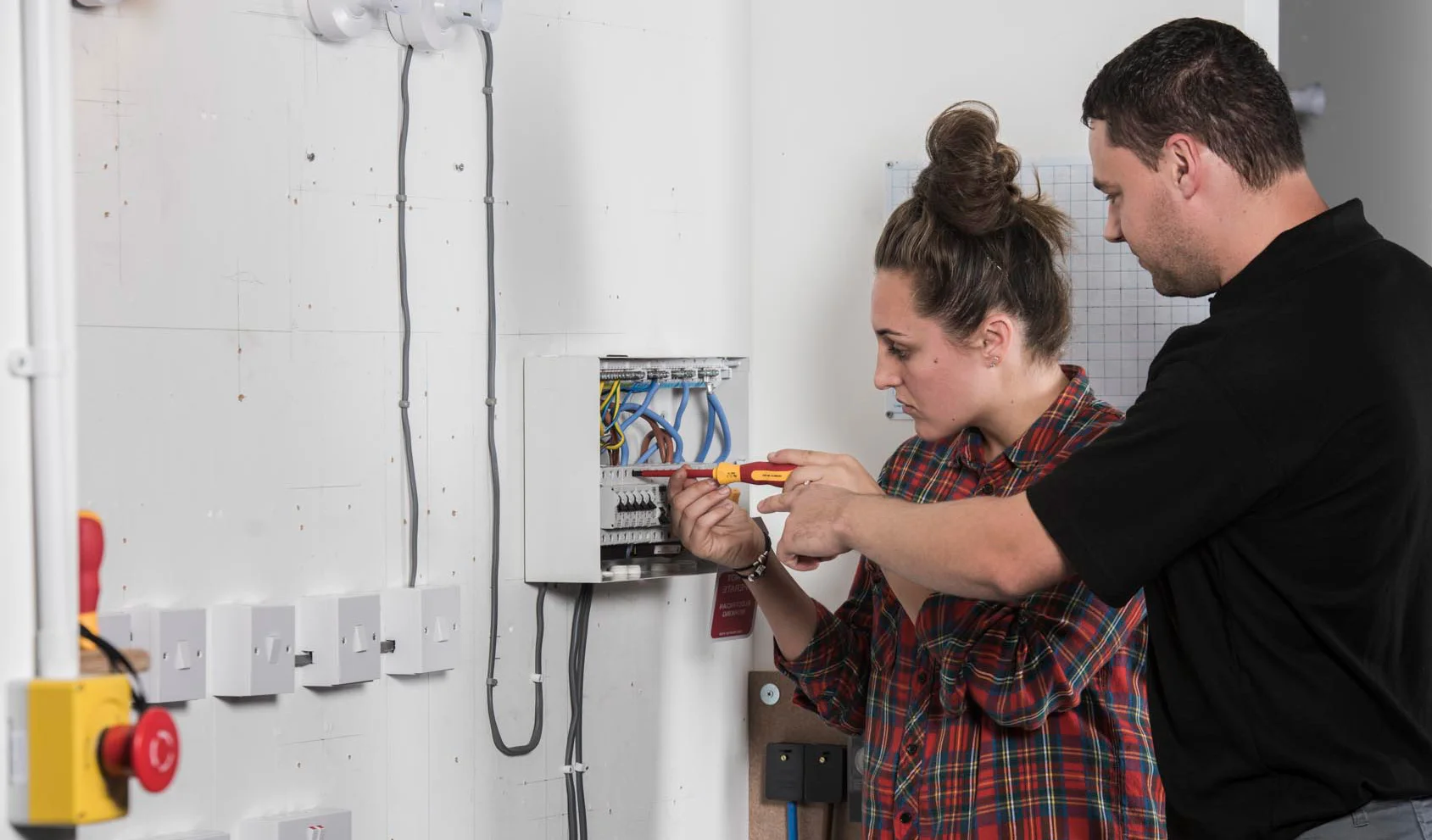Transform your career with an electrician apprenticeship that opens doors to endless opportunities in the UK’s thriving electrical trade.
Understanding Electrician Apprenticeships in the UK
Electrician apprenticeships in the UK represent a structured pathway to becoming a qualified electrical professional, combining practical work experience with classroom-based learning. These programmes typically span 3-4 years, leading to industry-recognised qualifications such as Level 3 NVQ Diploma in Installing Electrotechnical Systems and Equipment. The UK electrical industry currently employs over 265,000 professionals, with apprenticeships playing a crucial role in addressing the skills gap. During your apprenticeship, you’ll work alongside experienced electricians while attending college courses, usually on a day-release basis. This dual approach ensures you develop both practical skills and theoretical knowledge essential for a successful career in the electrical trade.
Essential Requirements and Qualifications
- Age Requirement: Minimum 16 years old, with no upper age limit
- Educational Prerequisites: At least 5 GCSEs at grades 9-4 (A*-C), including English, Maths, and Science
- Physical Requirements: Good level of fitness and ability to work at heights
- Personal Qualities: Strong problem-solving skills, attention to detail, and good communication abilities
- Additional Beneficial Qualifications: Level 2 Electrical Installation qualification or relevant technical certificates
Finding and Applying for Apprenticeship Opportunities
The UK offers numerous pathways to secure an electrical apprenticeship. The government’s official apprenticeship website currently lists over 1,000 electrical apprenticeship opportunities nationwide. Start by exploring these key channels:
- Government apprenticeship website (www.gov.uk/apply-apprenticeship)
- Electrical contractors and major employers
- Local colleges and training providers
- Industry bodies such as the JIB (Joint Industry Board)
- Specialist recruitment agencies
When applying, ensure your CV highlights relevant skills, work experience, and genuine interest in the electrical trade. Many successful applicants demonstrate practical experience through work experience or DIY projects.
What to Expect During Your Apprenticeship
Your apprenticeship journey will involve a comprehensive mix of practical and theoretical training. A typical week includes 4 days of on-site work and 1 day at college. You’ll learn essential skills including:
- Installing and maintaining electrical systems
- Fault finding and repairs
- Testing and inspection procedures
- Health and safety regulations
- Basic electronics and circuit theory
Assessment methods include practical tasks, written exams, and portfolio building. First-year apprentices typically earn £4.81 per hour, with wages increasing significantly as you progress through the programme.
Building a Strong Foundation for Success
Success in your electrical apprenticeship requires dedication, organisation, and a proactive approach to learning. Develop strong relationships with your mentor and colleagues, maintain detailed notes of your practical experiences, and actively participate in both on-site and classroom discussions. Create a structured study routine for theory work, and consider joining professional bodies like the ECA (Electrical Contractors’ Association) for additional support and networking opportunities.
Financial Aspects and Support
- Starting Wage: Minimum £4.81 per hour for apprentices
- Progression: Incremental increases based on age and experience
- Additional Support: Travel expense assistance, tool allowances, and learning material subsidies
- Future Earnings: Qualified electricians earn £32,000-£45,000 annually
- Benefits: Many employers offer pension schemes, health insurance, and additional training opportunities
Professional Development and Future Prospects
Upon completing your apprenticeship, numerous career advancement opportunities await. Qualified electricians can specialise in areas such as renewable energy systems, industrial automation, or smart home technology. The green energy sector particularly offers exciting prospects, with demand for electrical professionals expected to grow by 25% by 2025. Further qualifications can lead to roles in project management, electrical design, or running your own business.
Expert Tips for Securing Your Apprenticeship
- Research potential employers thoroughly before applying
- Gain relevant work experience or shadowing opportunities
- Prepare a strong CV highlighting technical aptitude and practical skills
- Practice interview questions focusing on problem-solving and safety awareness
- Demonstrate enthusiasm and commitment to the trade
- Consider obtaining a CSCS card before applying
Taking the Next Step
Ready to begin your electrical apprenticeship journey? Start by registering on the government apprenticeship website and creating alerts for new opportunities. Research local electrical contractors and training providers, and consider reaching out to current apprentices for insights. Remember to prepare all necessary documents, including proof of qualifications and references. The electrical trade offers a rewarding career with excellent progression opportunities and the chance to contribute to the UK’s evolving energy infrastructure. Take that first step today towards becoming a qualified electrician through an apprenticeship programme.
FAQ
Do apprenticeships pay a lot?
Over the course of their lifetimes, people who complete apprenticeship programs earn an average of $300,000 more than those who don’t complete an apprenticeship program. Apprenticeship salaries will vary depending on the profession and the type of apprenticeship (i.e., union apprenticeship vs.
Is it hard to get an apprenticeship?
It’s highly-competitive. To be an apprentice, you have to get out there, apply for work, impress at interview and be offered a job. You need to stand out as a must-hire candidate that an employer can see will be a good fit for their business with the potential to grow into the role and progress in the organisation.
How much does an apprenticeship cost?
Apprenticeship training is typically offered by the employer at no cost to the apprentice, but apprentices may need to cover certain expenses, such as tools or educational materials.
Sources
[1] https://www.phoenix.gov/administration/departments/hr/careers/apprenticeships/electrician-apprentice.html
[2] https://www.ibew48.com/join/start-your-career-electrician-apprentice
[3] http://www.calapprenticeship.org/programs/electrician_apprenticeship.php


Leave a Reply